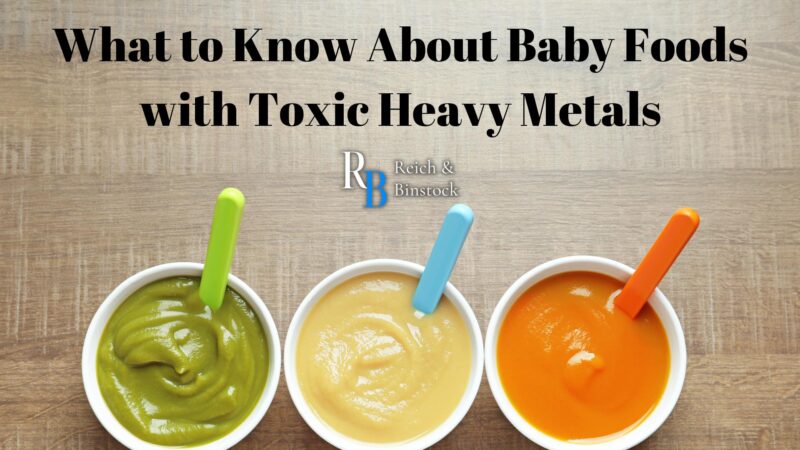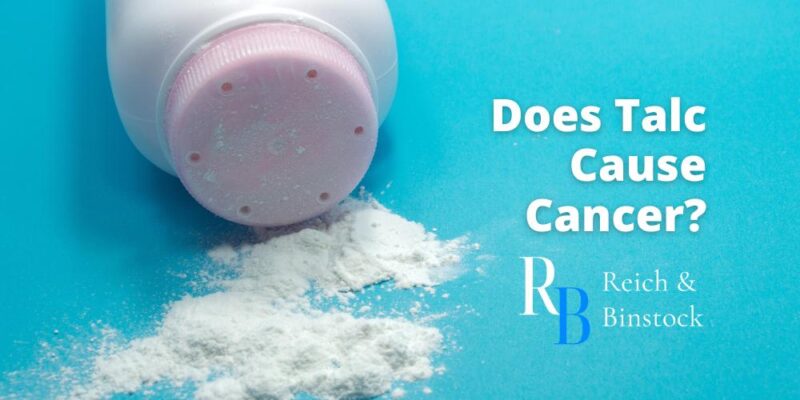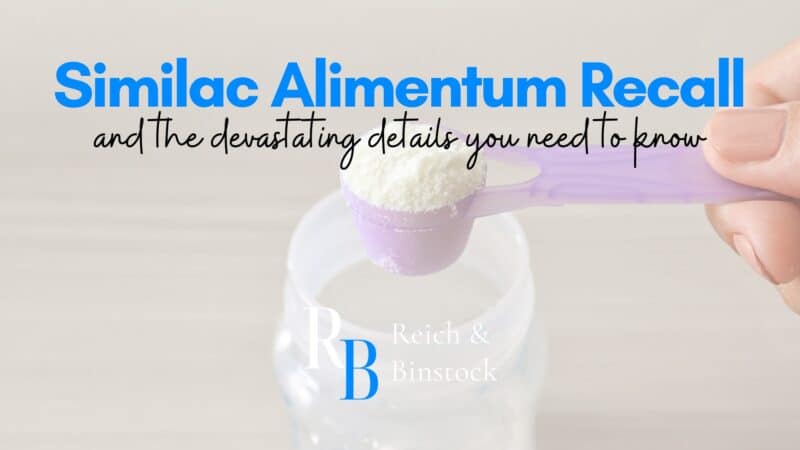Talcum Powder Lawsuit
Talcum Powder And Ovarian Cancer
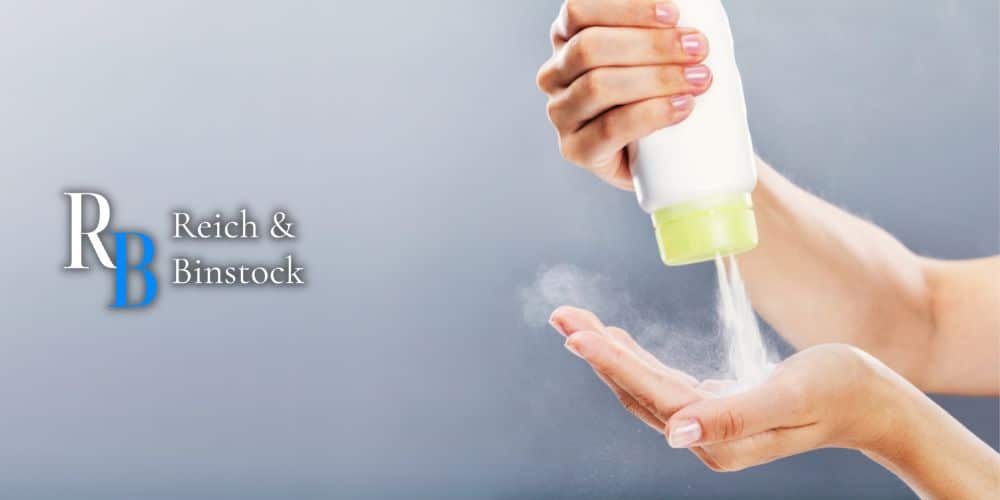
Talcum powder (commonly known as baby powder) has been widely used by consumers for decades. Individuals and families have it as a staple product in their personal hygiene and family routines. Recently, however, talcum powder has come under intense scrutiny as consumers come forward after suffering ovarian cancer. The correlation between the development of ovarian cancer and the routine use of baby powder has led to significant personal injury awards. If you suffered from ovarian cancer, lung cancer, or other cancers due to prolonged talcum powder exposure, you might have the basis for a talcum powder lawsuit.
At Reich & Binstock, our talcum powder lawyers believe that Johnson & Johnson’s baby powder poses an increased risk of certain cancers. Talcum powder lawsuits allege that J&J knew that their talcum powder products posed a risk of ovarian cancer yet did nothing. Certain published medical journal studies dating back to more than two decades ago claimed that around 10% of all ovarian cancer diagnoses were linked to Johnson & Johnson talcum powder use in the genital area. This is shocking, as J&J should have known about these studies. However, they never warned the FDA or the general population.
If you or a loved one received an ovarian cancer or lung cancer diagnosis after prolonged talcum powder usage, you might have a valid talc powder or baby powder lawsuit. The talcum powder lawyers at Reich & Binstock are here to help you. To schedule your free consultation with us, please call 713-622-7271 today.
Talcum Powder Lawsuit Update 2022
Currently, the judge presiding over the talcum powder lawsuits in North Carolina, Judge Michael Kaplan, has expressed frustration over J&J’s handling of the cases. There are 38,000 pending talcum powder lawsuits against the controversial company. The Johnson & Johnson baby powder lawsuits have been stalled by the company’s bankruptcy filing.
The filing has triggered what is called the “automatic stay.” An automatic stay basically prevents your creditors (in this case, the plaintiffs) from collecting their debts from you. This automatic stay went into effect in February 2022.
Initially, the automatic stay was kept in place to facilitate discussions between the plaintiffs and Johnson & Johnson about a potential global settlement. However, J&J isn’t offering fair settlement amounts to plaintiffs. This has brought talcum powder cases to a halt.
Bankruptcy Judge Kaplan’s growing frustration with J&J’s stalling of the bankruptcy court is clear. He stated that he is considering a partial lift of the automatic stay. This would allow talcum powder bellwether trials to take place. Many hope that these bellwether trials will bring talcum litigation and settlement talks back into the spotlight.
What Is Talcum Powder?
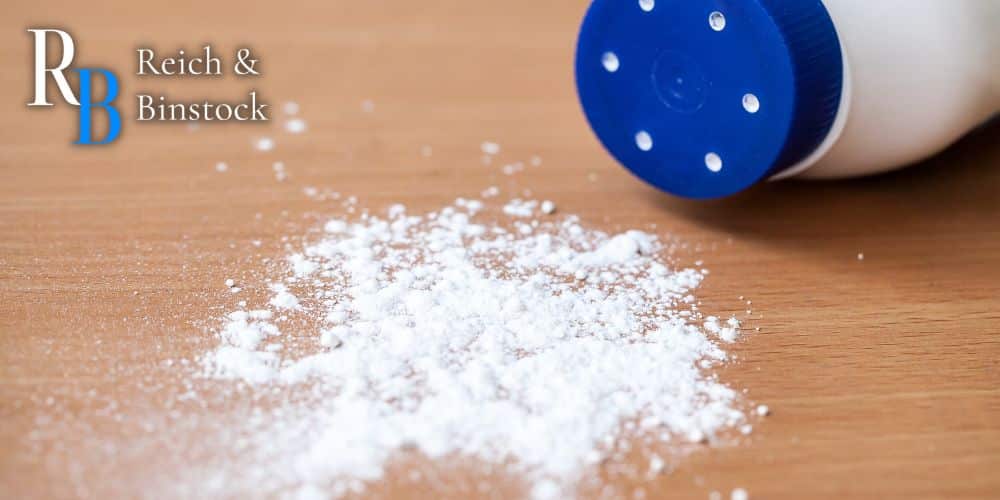
Talcum powder, otherwise known as talc powder or baby powder, is a mineral made up of silicon, magnesium, and oxygen. In its powder form, talc-based body powder easily absorbs moisture, prevents skin friction, and prevents rashes. Talcum powder products are very widely used. Examples of these products include cosmetic talcum powder, Johnson and Johnson baby powder, facial and body powders, and other talc products.
Talc is a naturally occurring mineral that sometimes contains asbestos. Asbestos is a substance that has carcinogenic risks when inhaled. In fact, talc miners are particularly susceptible to lung cancer and mesothelioma after prolonged asbestos exposure.
Most of the concerns surrounding talcum powder litigation involve two situations.
- Are talc miners and others who endure long-term talcum powder exposure at a higher risk of lung cancer?
- Do women who regularly engage in genital talcum powder use have a higher ovarian cancer risk?
Does Talcum Powder Cause Cancer?
So, does talc cause cancer? Before we dive into this question, we must establish that there are two kinds of talc. Some talc particles are completely asbestos-free. Others are not. Additionally, talc inhalation can cause chest pain, breathing difficulties, coughing, and wheezing. In fact, baby powder is actually more toxic to babies than it is to adults, as they are more susceptible to the damage it can do.
For this reason, Johnson & Johnson’s baby powder containers have a warning label about talcum powder use. They warn users to avoid talcum powder use near the face or mouth, as this can lead to inhalation. However, there is no warning about the alleged link between non-asbestos-free talc and the risk of ovarian cancer.
Plaintiffs in the talcum powder lawsuits have urged J&J to add another warning label to the packaging of their talcum powder products. The warning label would include warnings about potential mesothelioma or ovarian cancer risk associated with talc particles. Below, we include information about the cancer risk associated with talc powder.
Ovarian Cancer

According to multiple case-control studies and prospective cohort studies, there is a statistically significant association between talc products and serious ovarian cancer. Although findings are somewhat mixed, this is a difficult study to conduct. Ovarian cancer is fairly uncommon, which means that any study conducted on the matter might not have been large enough to produce conclusive results. However, research surrounding talcum powder, baby powder, cosmetic talc, and other talc products continues.
Lung Cancer
Additionally, studies of talc miners have suggested an increased risk of lung cancer and other respiratory illnesses. Again, the findings are somewhat mixed. Occupational exposure to talc becomes more dangerous if the talc naturally occurs with other possibly carcinogenic materials. Natural talc may contain asbestos fibers and other harmful substances. Additionally, working underground poses the risk of radon exposure. Cosmetic products and other talc products have been purified, unlike naturally-occurring talc.
Other Cancers
Talc products have not been as firmly associated with other cancers. However, one study reported that talcum powder might lead to an increased endometrial cancer risk. This study applied mainly to post-menopausal women. Other research has explored a possible link between talc powder and stomach cancer. Once again, the findings are currently inconclusive.
How Does Talc Cause Ovarian Cancer?
The American Cancer Society currently lists talc powder as a potential risk factor for ovarian cancer. Another organization that classifies talcum powder as a possible human carcinogen is the International Agency for Research on Cancer, which is part of the World Health Organization. But how exactly does Johnson & Johnson baby powder or cosmetic talc cause ovarian cancer?
Currently, all we have are theories about how talcum powder might cause ovarian cancer. One theory states that when women use talcum powder near their genital area, the talcum powder could enter the vaginal canal. Through the vagina, the powder particles travel through the uterus, then through the fallopian tubes to the ovaries. If this powder causes an inflammatory response from the body, these conditions could increase the likelihood of cancer growing in the area.
Johnson & Johnson is one of the nation’s major talcum powder manufacturers and sellers. In fact, they sell it in different forms. One form is the classic Johnson’s baby powder. The other form is their Shower to Shower powder. J&J is aware of the research that links baby powder and talcum powder with cancer. Yet, they continue to do nothing and attempt to avoid fair settlements for those who developed ovarian cancer.
Talcum Powder Mesothelioma Connection
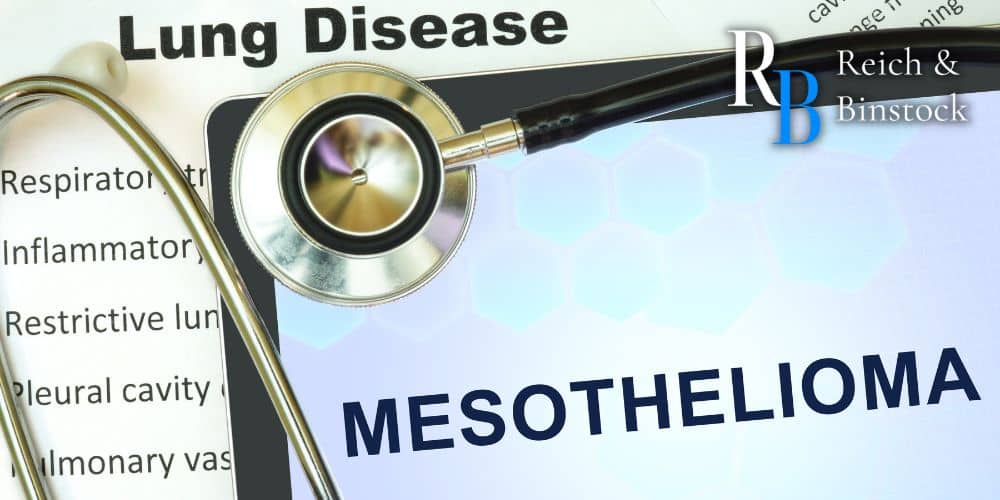
Some studies show a link between prolonged talcum powder exposure and mesothelioma. Mesothelioma is a rare yet deadly form of cancer. The related studies and lawsuits claim that talc supplier Johnson & Johnson, as well as other companies, knew their products posed a mesothelioma risk. Although the FDA requires talc products to be asbestos-free, they do not require any talc supplier to submit safety reports about their products.
Products Containing Talcum Powder
If you’re worried you’ve developed ovarian cancer or another form of cancer from talc products, you may be wondering which products you should avoid. In some cases, other companies have manufactured viable alternatives to talc-based products. One example is cornstarch-based baby powder. Cornstarch greatly helps to absorb moisture, much like talc. Yet it doesn’t come with the risk of asbestos contamination.
Other talc containing products to be aware of include but aren’t limited to:
- Baby powder and body powder
- Cosmetics
- Ceramics
- Paint
- Children’s toys
- Crayons
- Certain medications and pills
- Paper
- Building materials
- Insecticides
Talcum Powder Alternatives
Once upon a time, most people associated talcum powder with their daily hygiene routine and baby’s diapers. Recently, however, people have discovered a more sinister connection to cancer. This has understandably made many people wary of talcum powder and baby powder. Thus, they’ve turned to other, increasingly popular talcum powder alternatives.
Some of the most popular talcum powder alternatives include:
- Cornstarch
- Baking soda
- Tapioca starch
- Arrowroot starch
- Kaolin clay
- Rice starch
- Oat flour
Who Qualifies for the Talcum Powder Cancer Lawsuit?

People can develop an illness from exposure to a wide range of elements. In the case of talcum powder, manufacturers like Johnson & Johnson failed to warn consumers of the risks associated with using the product. Despite Johnson & Johnson’s awareness of the potential risks, they did not provide complete information to consumers, ultimately leaving consumers unable to protect themselves from the risks of baby powder use.
With more than 30 years of experience in helping injured consumers, we have seen the ways negligent product manufacturers try to thwart liability when they were clearly not protecting consumers from hazards. We can work with independent investigators and expert witnesses — people who can shed light on the reality behind your injury, ultimately making a strong case for maximum compensation.
Talc Powder Lawsuit Statute of Limitations
Talcum powder lawsuits concern an area of law known as product liability. In Texas, consumers have two years from the discovery of their injury to file a product liability claim. It’s important to bring talcum powder cases sooner rather than later. We recommend speaking with an attorney who has experience in talc litigation for your case.
What Is the Average Payout for Talcum Powder Lawsuits?

Rather than understanding the average payout for talcum powder lawsuits, it’s better to understand what your individual case might be worth. Settlement administrators in global settlement cases will consider each plaintiff’s unique circumstances when making an offer. This makes it difficult to advise clients on numbers and estimates for these cases. However, we can give you an idea of what the administrator considers when making an offer.
Factors that determine Johnson & Johnson talcum powder lawsuit damages:
- How old you were when the injury occurred
- How extreme your losses and damages were
- Your individual talcum powder case’s strength if you went to trial
- How much money the defendant has to settle claims
How Long Does It Take to Settle a Talcum Powder Case?
This is another difficult question to answer. However, most mass tort cases tend to settle before going to trial. This is true even in talc litigation cases. Thousands of Johnson & Johnson talcum powder lawsuits are currently pending. Luckily, reaching a settlement seems to be the goal for these cases. While this usually takes less time than going to trial court, victims may still have to wait before receiving compensation. This is especially true in baby powder lawsuits, as J&J has entangled the settlement process with a bankruptcy process.
Other factors that may affect the timeline for these cases include:
- Possible early settlements
- Protracted settlement negotiations
- Mandatory settlement conferences
- Verdicts in related or similar cases
File a Talcum Powder Lawsuit Today

You deserve support when you have suffered ovarian cancer caused by Johnson & Johnson talcum powder use. We are here to help. Contact our office in Houston online or by telephone at 713-622-7271 to arrange a free consultation with an experienced talcum powder lawyer. We represent clients nationwide for pharmaceutical injury and defective medical device cases. If you were diagnosed with ovarian cancer, epithelial ovarian cancer, serous ovarian cancer, or another form of cancer after frequent talc powder use, you might have a valid talcum powder lawsuit. Reich & Binstock’s attorneys are here to represent injured victims in the ongoing talc trials. Any confidential or sensitive information that you give us will remain confidential.
There is never a fee unless we recover on your behalf.












